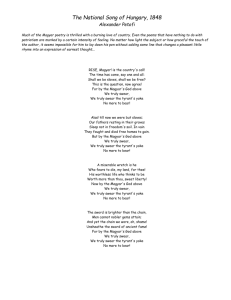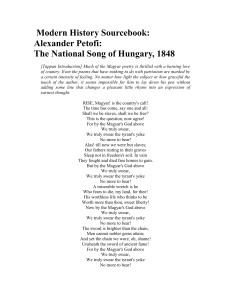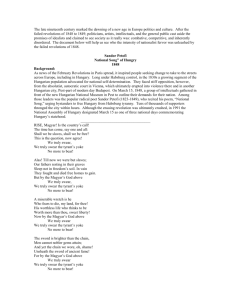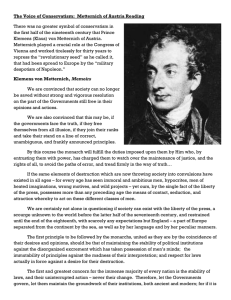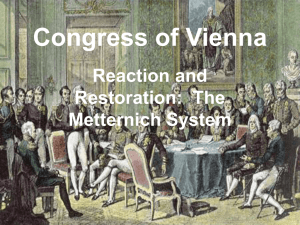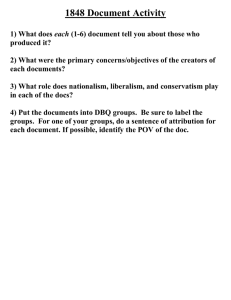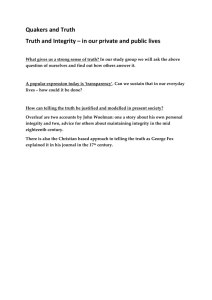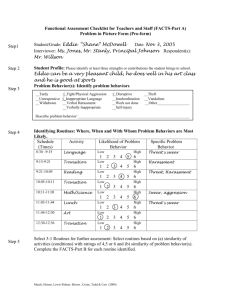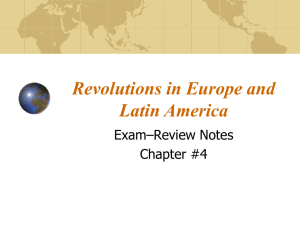we demand the ballot.
advertisement
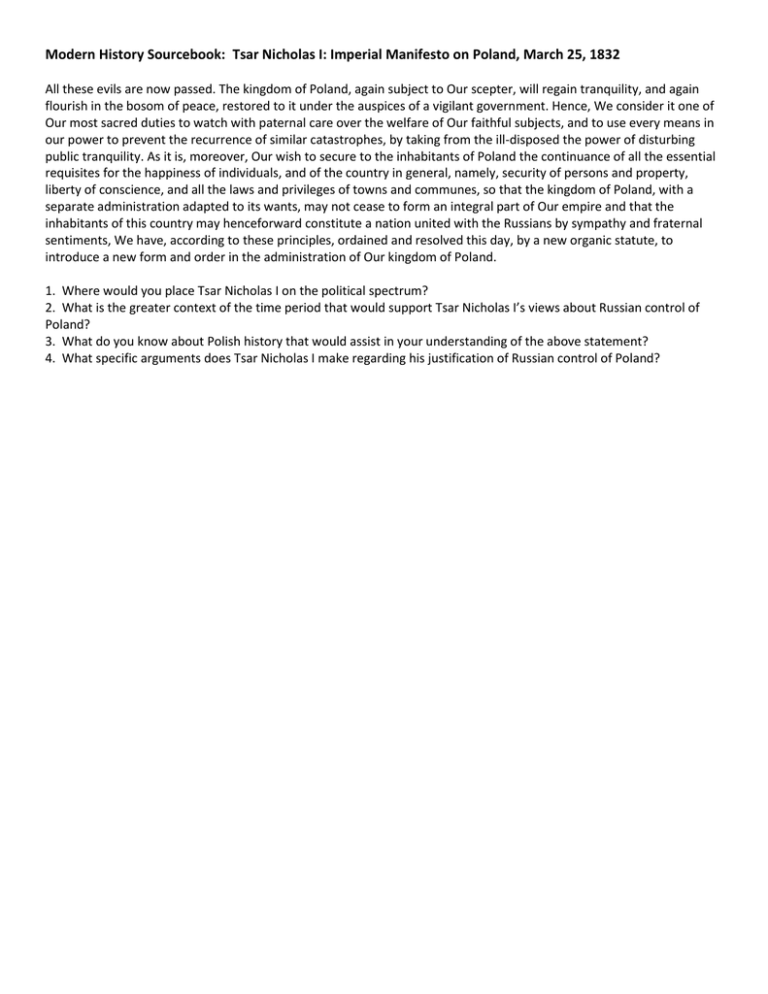
Modern History Sourcebook: Tsar Nicholas I: Imperial Manifesto on Poland, March 25, 1832 All these evils are now passed. The kingdom of Poland, again subject to Our scepter, will regain tranquility, and again flourish in the bosom of peace, restored to it under the auspices of a vigilant government. Hence, We consider it one of Our most sacred duties to watch with paternal care over the welfare of Our faithful subjects, and to use every means in our power to prevent the recurrence of similar catastrophes, by taking from the ill-disposed the power of disturbing public tranquility. As it is, moreover, Our wish to secure to the inhabitants of Poland the continuance of all the essential requisites for the happiness of individuals, and of the country in general, namely, security of persons and property, liberty of conscience, and all the laws and privileges of towns and communes, so that the kingdom of Poland, with a separate administration adapted to its wants, may not cease to form an integral part of Our empire and that the inhabitants of this country may henceforward constitute a nation united with the Russians by sympathy and fraternal sentiments, We have, according to these principles, ordained and resolved this day, by a new organic statute, to introduce a new form and order in the administration of Our kingdom of Poland. 1. Where would you place Tsar Nicholas I on the political spectrum? 2. What is the greater context of the time period that would support Tsar Nicholas I’s views about Russian control of Poland? 3. What do you know about Polish history that would assist in your understanding of the above statement? 4. What specific arguments does Tsar Nicholas I make regarding his justification of Russian control of Poland? Modern History Sourcebook: Prince Klemens von Metternich: Political Confession of Faith, 1820 Prince Klemens von Metternich (1773-1859) was the leading figure in European government up until 1848. As political master of the Austrian Empire, he was the architect of an alliance system among the European powers after Napoleon's defeat - a system which tried to undo the damage to traditional dynastic politics wrought by the French revolution. From Prince Klemens von Metternich. Political Confession of Faith (1820) …[T]he revolutionary seed had penetrated into every country and spread more or less. It was greatly developed under the régime of the military despotism of Bonaparte. His conquests displaced a number of laws, institutions, and customs; broke through bonds sacred among all nations, strong enough to resist time itself; which is more than can be said of certain benefits conferred by these innovators. From these perturbations it followed that the revolutionary spirit could in Germany, Italy, and later on in Spain, easily hide itself under the veil of patriotism… In short, let the great monarchs strengthen their union, and prove to the world that if it exists, it is beneficent, and ensures the political peace of Europe: that it is powerful only for the maintenance of tranquillity at a time when so many attacks are directed against it; that the principles which they profess are patenlal and protective, menacing only the disturbers of public tranquillity.... To every great State determined to survive the storm there still remain many chances of salvation, and a strong union between the States on the principles we have announced will overcome the storm itself. From Prince Klemens von Metternich, Memoirs of Prince Metternich, 1815-1829, ed. 1. Explain specifically the political aims of Metternich. What specific evidence can you pull from the reading to support your explanation? 2. Why is knowing that Metternich is from Austria important in your understanding of his political goals and aims? 3. What specific policies are directly tied to the events of the French Revolution? 4. Compare Metternich to another thinker/ruler that we have studied in this course. 5. Contrast Metternich to another thinker/ruler that we have studied in this course. Modern History Sourcebook: Giuseppe Mazzini: On Nationality, 1852 Giuseppe Mazzini (18051872), the founder (1831) of Young Italy, was perhaps the leading figure in liberal nationalism. He saw the creation of a democratic Italian state as crucial to Italy's development. Europe no longer possesses unity of faith, of mission, or of aim. Such unity is a necessity in the world. The question of nationality can only be resolved by destroying the treaties of 1815, and changing the map of Europe and its public Law. The question of Nationalities, rightly understood, is the Alliance of the Peoples; the balance of powers based upon new foundations; the organisation of the work that Europe has to accomplish. ... It was not for a material interest that the people of Vienna fought in 1848; in weakening the empire they could only lose power. It was not for an increase of wealth that the people of Lombardy fought in the same year; the Austrian Government had endeavoured in the year preceding to excite the peasants against the landed proprietors, as they had done in Gallicia; but everywhere they had failed. They struggled, they still struggle, as do Poland, Germany, and Hungary, for country and liberty; for a word inscribed upon a banner, proclaiming to the world that they also live, think, love, and labour for the benefit of all. They speak the same language, they bear about them the impress of consanguinity, they kneel beside the same tombs, they glory in the same tradition; and they demand to associate freely, without obstacles, without foreign domination, in order to elaborate and express their idea; to contribute their stone also to the great pyramid of history. It is something moral which they are seeking; and this moral something is in fact, even politically speaking, the most important question in the present state of things. It is the organisation of the European task. It is no longer the savage, hostile, quarrelsome nationality of two hundred years ago which is invoked by these peoples. The nationality . . . founded upon the following principle:-Whichever people, by its superiority of strength, and by its geographical position, can do us an injury, is our natural enemy; whichever cannot do us an injury, but can by the amount of its force and by its position injure our enemy, is our natural ally, -is the princely nationality of aristocracies or royal races. The nationality of the peoples has not these dangers; it can only be founded by a common effort and a common movement; sympathy and alliance will be its result. In principle, as in the ideas formerly laid down by the men influencing every national party, nationality ought only to be to humanity that which the division of labour is in workshop-the recognised symbol of association; the assertion of the individuality of a human group called by its geographical position, its traditions, and its language, to fulfil a special function in the European work of civilisation. The map of Europe has to be remade. This is the key to the present movement; herein lies the initiative. Before acting, the instrument for action must be organised; before building, the ground must be one's own. The social idea cannot be realised under any form whatsoever before this reorganisation of Europe is effected; before the peoples are free to interrogate themselves; to express their vocation, and to assure its accomplishment by an alliance capable of substituting itself for the absolutist league which now reigns supreme. Giuseppe Mazzini, "Europe: Its Condition and Prospects," Essays: Selected from the Writings, Literary, Political and Religious of Joseph Mazzini, ed. William Clark (London: Walter Scott, 1880), pp. 266, 27778, 29192. 1. Using specific passages from the above text, explain Mazzini’s political aims. 2. How do Mazzini’s ideas challenge the prevailing ideas of the Congress of Vienna? Modern History Sourcebook: Alexander Petofi: The National Song of Hungary, 1848 RISE, Magyar! is the country's call! The time has come, say one and all: Shall we be slaves, shall we be free? This is the question, now agree! For by the Magyar's God above We truly swear, We truly swear the tyrant's yoke No more to bear! Alas! till now we were but slaves; Our fathers resting in their graves Sleep not in freedom's soil. In vain They fought and died free homes to gain. But by the Magyar's God above We truly swear, We truly swear the tyrant's yoke No more to bear! A miserable wretch is he Who fears to die, my land, for thee! His worthless life who thinks to be Worth more than thou, sweet liberty! Now by the Magyar's God above We truly swear, We truly swear the tyrant's yoke No more to bear! The sword is brighter than the chain, Men cannot nobler gems attain; And yet the chain we wore, oh, shame! Unsheath the sword of ancient fame! For by the Magyar's God above We truly swear, We truly swear the tyrant's yoke No more to bear! The Magyar's name will soon once more Be honored as it was before! The shame and dust of ages past Our valor shall wipe out at last. For by the Magyar's God above We truly swear, We truly swear the tyrant's yoke No more to bear! And where our graves in verdure rise, Our children's children to the skies Shall speak the grateful joy they feel, And bless our names the while they kneel. For by the Magyar's God above We truly swear, We truly swear the tyrant's yoke No more to bear! 1. How is this document a reaction to the historical context of the time? How might this document impact the historical context of this time? 2. Use specific evidence in this document to illustrate how nationalism can be a motive for revolution. Chartism: The People's Petition, 1838 Chartism was an English working class radical movement centered on a 'People's Charter" (1837) of six points. In 1838 a national Petition was collected and submitted to Parliament. National Petition Unto the Honourable the Commons of the United Kingdom of Great Britain and Ireland in Parliament assembled, the Petition of the undersigned, their suffering countrymen. WE DEMAND UNIVERSAL SUFFRAGE. The suffrage to be exempt from the corruption of the wealthy, and the violence of the powerful, must be secret. The assertion of our right necessarily involves thepower of its uncontrolled exercise. WE DEMAND THE BALLOT. The connection between the representatives and the people, to be beneficial must be intimate. The legislative and constituent powers, for correction and for instruction, ought to be brought into frequent contact. To public safety as well as public confidence, frequent elections are essential. WE DEMAND ANNUAL PARLIAMENTS. With power to choose, and freedom in choosing, the range of our choice must be unrestricted. We are compelled, by the existing laws, to take for our representatives, men who are incapable of appreciating our difficulties, or who have little sympathy with them; merchants who have retired from trade, and no longer feel its harassings; proprietors of land who are alike ignorant of its evils and their cure; lawyers, by whom the honours of the senate are sought after only as means of obtaining notice in the courts. 1. What specific historical context can you draw on to help explain the petition of the Chartists? 2. What specifically are the Chartists demanding and what evidence do they use in their argument to support their request? 3. Connect the arguments of the Chartists to another similar idea in previous history? 4. Who, from our study to date, would agree with the Chartists? Who, from our study to date, would disagree with the Chartists?
